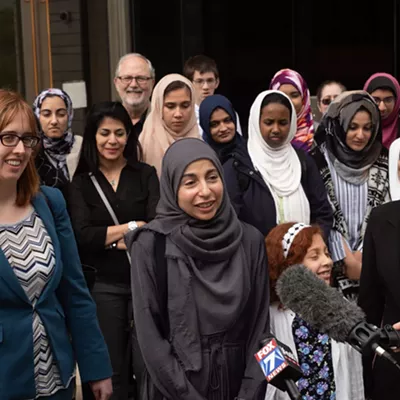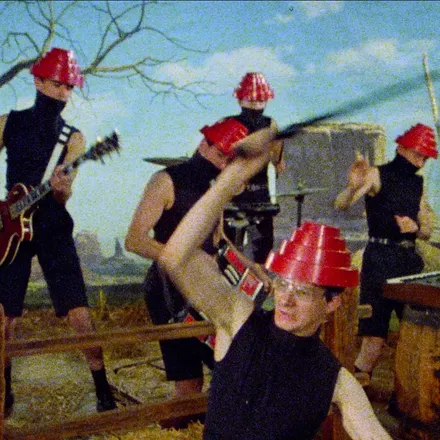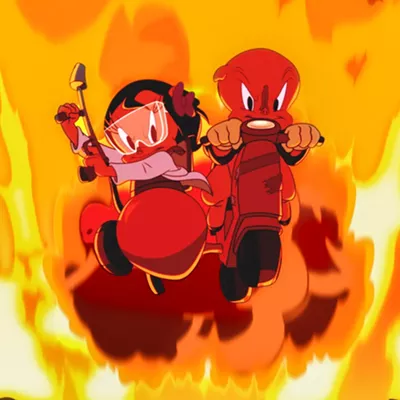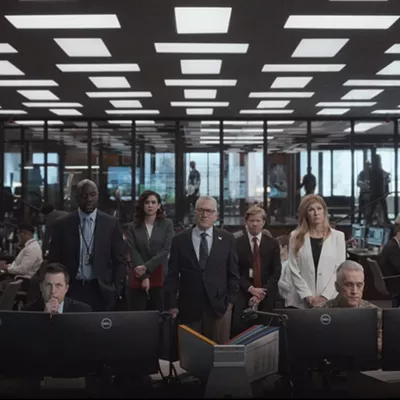If your first instinct when watching Oscar-nominated documentary No Other Land is to look away, that's understandable. The work by a team of Palestinian and Israeli filmmakers is a harrowing, intense and deeply upsetting chronicle of the displacement of Palestinians by Israeli forces, and the filmmakers themselves never look away from the horrific actions they witness. It's disappointing but not surprising that even after widespread acclaim and numerous film-festival awards, No Other Land failed to find a U.S. distributor, and is instead being released independently for individual bookings at theaters like the Magic Lantern. At least the public now has the opportunity to see it, and the Oscars — where the film is a heavy favorite to win Best Documentary — should further boost its chances for a more extensive release.
No Other Land is not easy to watch, but it's a powerful and compelling look at an ongoing injustice. Unlike many social-issue documentaries that come off as glorified news reports, No Other Land is immersive and cinematic, anchored by central figures who form an unlikely friendship and alliance. There are no abstract statistics or talking points about what's happening to Palestinians in the West Bank — there's activist and filmmaker Basel Adra, defending his community and his family's home while frequently putting his own life on the line.
Adra lives in the Masafer Yatta region of the West Bank, where the Israeli military has been systematically destroying homes and displacing residents. "I started filming when we started to end," he says early in the movie, which begins in summer 2019, although it also incorporates footage going back to Adra's childhood, culled from the archives of his father, a fellow activist. Adra points his camera at the Israeli soldiers leading demolition crews to make way for what they claim will be a military training ground, forcing many of Adra's neighbors to take shelter in caves. He highlights the resilience of people who rebuild overnight only to see their efforts taken down again the next day, who get shot for trying to hold onto basic necessities like generators.
Adra's story is affecting and compelling on its own, but what makes No Other Land even more urgent is his connection with Israeli journalist Yuval Abraham, who comes to Masafer Yatta to report on the conflict, despite his fellow Israelis' indifference. The coalition formed by Palestinians and Israelis (including fellow co-directors Hamdan Ballal and Rachel Szor) gives No Other Land a sense of hope, even if that sense is often shattered, both by the events depicted in the movie and by viewers' outside knowledge.
Adra chastises Abraham for expecting his activist efforts to show immediate results, when Palestinians have spent decades fighting for their rights. Yet Adra can't help expressing his own optimism that documenting the Israeli government's atrocities will inspire the U.S. to put pressure on Israel to stop — an especially misguided belief, given recent real-world events. It's heartbreaking to see what Adra and the other Masafer Yatta residents go through, and it's even more heartbreaking to realize that the support they hope to rally with their film hasn't materialized.
That doesn't mean that all is lost, though, and the small human moments in No Other Land offer as much solace as the broader activism. Even when Adra is worried he might be arrested, his mother tells him to grab a coat so he won't get cold. Later, she offers to wash his clothes so he has something clean to wear if he's taken to jail. The filmmakers could leave these little interactions out, but No Other Land is more effective because it's not just a constant stream of violence and horror. The people in Masafer Yatta continue to live their lives, because that's all they can do.
No Other Land is also an artfully constructed film, and Adra and his collaborators are all able to capture strikingly composed images even while presumably under extreme duress. Certain evocative frames encapsulate the movie's themes just as poignantly as any conversation: a faded military warning sign on which "danger" now looks like "anger," a cluster of black balloons floating off into the air after a scared protester had to let them go while being chased by the police.
Shot over the course of more than four years (ending just before the Oct. 7 Hamas attacks), No Other Land is skillfully edited into a seamless narrative, with an ebb and flow of quiet reflection and stark confrontation. Even at just 95 minutes, it can feel exhausting, and there's a risk of bombarding the audience to the point that some viewers may tune out. Looking away may offer some relief, but there's always something to bring your attention back, to show the truth in a way that can't be ignored.
![]()
No Other Land
Directed by Basel Adra, Hamdan Ballal, Yuval Abraham, Rachel Szor
Screening at the Magic Lantern

























